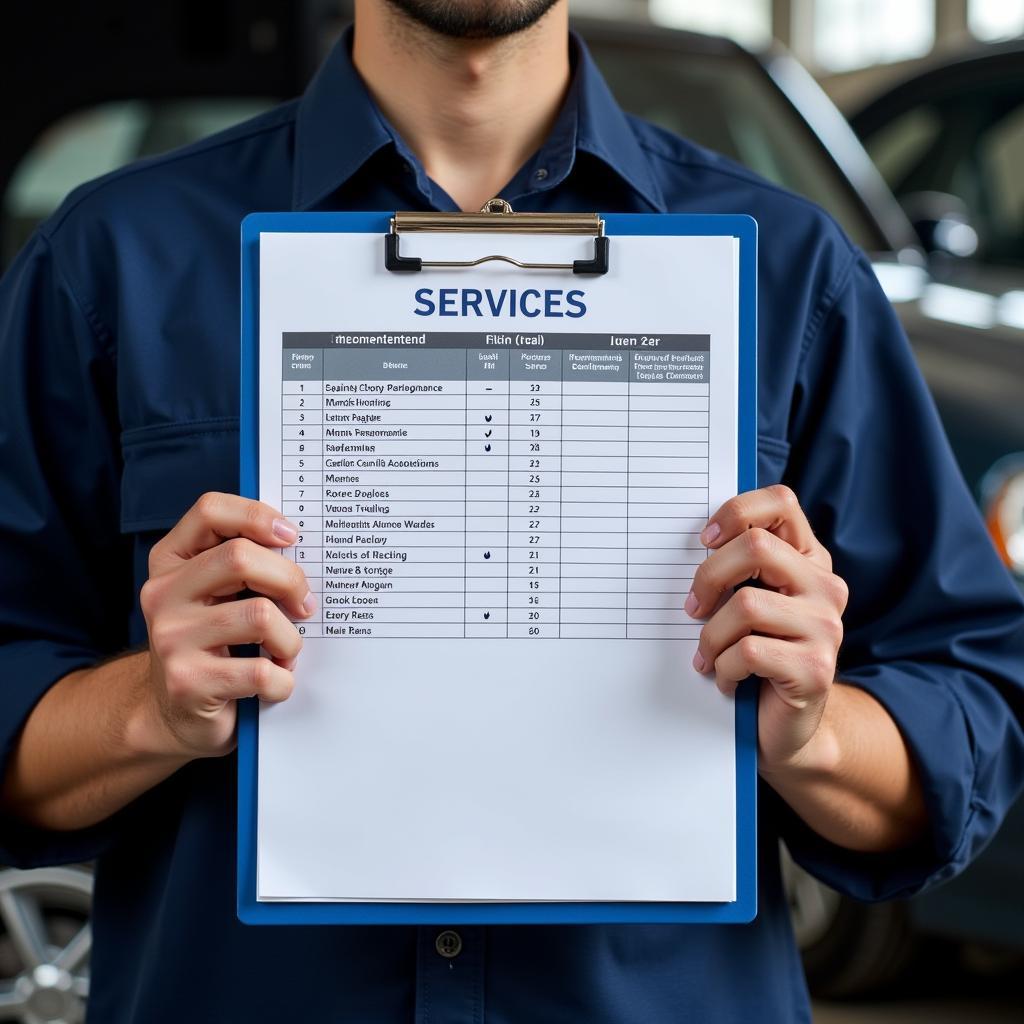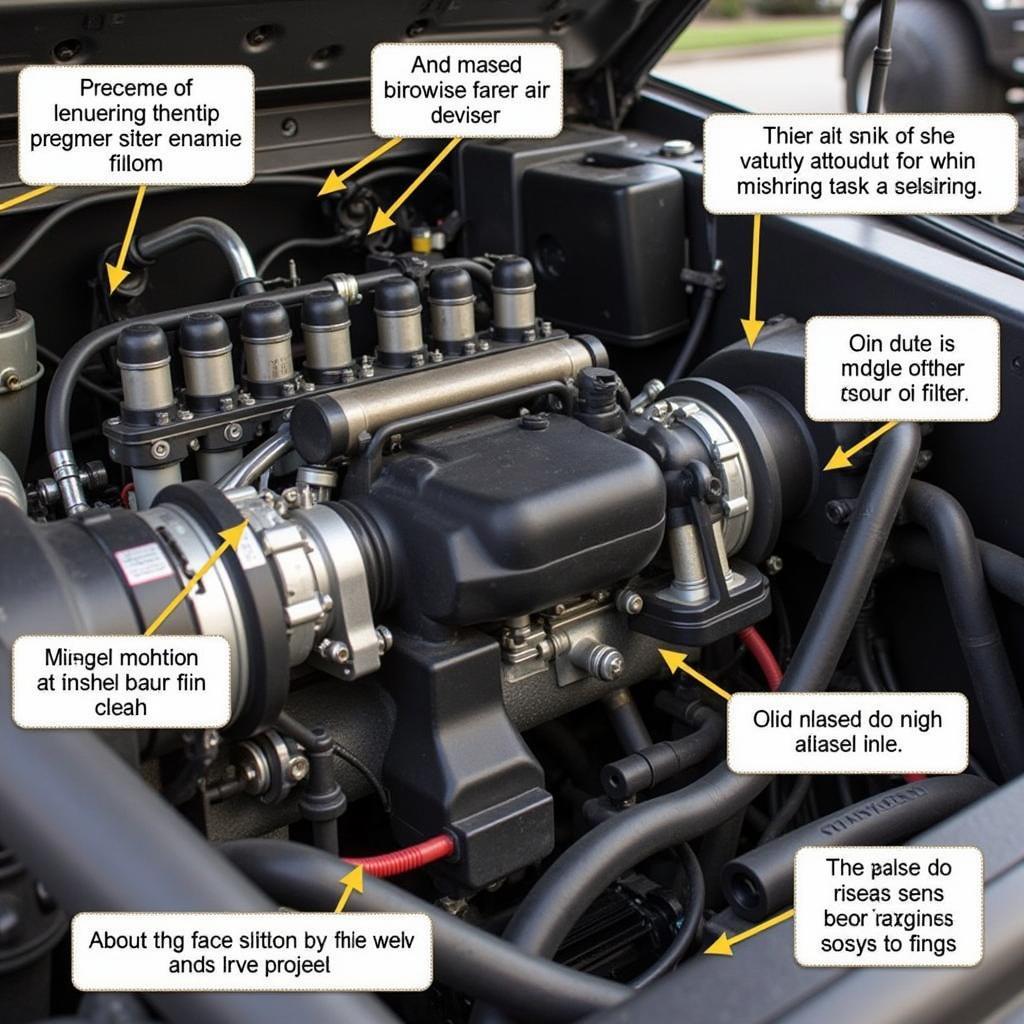When to Get a Car Service: The Complete Guide
Knowing When To Get A Car Service is crucial for maintaining your vehicle’s performance, extending its lifespan, and ensuring your safety on the road. While traditional advice often revolves around mileage intervals, modern vehicles and driving habits require a more nuanced approach. This comprehensive guide delves into the factors influencing car service schedules, empowering you to make informed decisions about your vehicle’s maintenance needs.
Understanding Your Car’s Service Schedule
Every vehicle comes with a manufacturer-recommended service schedule outlined in the owner’s manual. This schedule details specific maintenance tasks and their recommended intervals, typically categorized by mileage or time elapsed, whichever comes first.
Common service intervals include:
- Every 5,000-7,500 miles: Oil and filter change, tire rotation, brake inspection
- Every 15,000-30,000 miles: Air filter replacement, cabin air filter replacement, spark plug replacement (depending on type)
- Every 30,000-60,000 miles: Coolant flush, transmission fluid change (for some vehicles), serpentine belt inspection
- Every 60,000-90,000 miles: Timing belt replacement (for interference engines), differential fluid change
 Car Service Schedule
Car Service Schedule
Adhering to these recommendations ensures your vehicle receives timely attention and helps prevent potential problems from escalating into costly repairs. However, remember that these are general guidelines.
Factors Affecting Car Service Intervals
While mileage and time are essential factors, several other variables can impact your car’s service needs.
- Driving Conditions: Frequent stop-and-go city driving, extreme temperatures, dusty environments, and heavy loads put additional strain on your vehicle, necessitating more frequent servicing.
- Driving Style: Aggressive driving habits like rapid acceleration and hard braking can accelerate wear and tear, requiring more frequent maintenance.
- Vehicle Age: Older vehicles might require more frequent inspections and fluid changes due to normal wear and potential leaks.
- Vehicle Type: High-performance vehicles or those used for towing might require more frequent servicing due to increased stress on their components.
Warning Signs Your Car Needs a Service
Apart from scheduled maintenance, it’s crucial to be aware of warning signs indicating your car requires immediate attention. Ignoring these signs can lead to further damage and costly repairs.
Common warning signs include:
- Unusual Noises: Squealing brakes, grinding gears, knocking from the engine, or any unfamiliar sounds.
- Fluid Leaks: Puddles of fluid under your car, such as oil, coolant, brake fluid, or transmission fluid.
- Warning Lights: Illumination of dashboard warning lights, like the check engine light, oil pressure light, or battery light.
- Performance Issues: Reduced fuel efficiency, difficulty starting, rough idling, engine misfires, or decreased acceleration.
- Handling Problems: Pulling to one side, vibrations in the steering wheel, or a spongy brake pedal.
If you experience any of these warning signs, it’s vital to take your car to a qualified mechanic for a comprehensive inspection and diagnosis.
The Importance of Regular Car Servicing
Regular car servicing offers numerous benefits beyond simply keeping your vehicle running smoothly.
Benefits of regular car servicing:
- Enhanced Safety: Regular inspections and maintenance ensure all safety-critical components are in optimal condition, reducing the risk of accidents.
- Improved Performance: Well-maintained vehicles perform better, offering better fuel efficiency, smoother handling, and increased reliability.
- Extended Lifespan: Timely servicing helps prevent premature wear and tear, extending your vehicle’s lifespan and saving you money in the long run.
- Higher Resale Value: A well-maintained vehicle with a documented service history commands a higher resale value.
- Peace of Mind: Knowing your vehicle is in top condition provides peace of mind and confidence on the road.
Conclusion
Knowing when to get a car service is vital for ensuring your vehicle’s longevity, performance, and safety. While adhering to the manufacturer-recommended service schedule is essential, understanding the factors influencing your car’s individual needs and recognizing warning signs empowers you to make informed decisions about your vehicle’s maintenance.
Remember, regular car servicing is an investment, not an expense, paying dividends in the long run through improved safety, performance, and peace of mind.
FAQs
Q: How often should I get my oil changed?
A: While general guidelines suggest every 5,000-7,500 miles, refer to your owner’s manual for your specific vehicle’s recommendation.
Q: Can I service my car myself?
A: While some basic maintenance tasks can be done at home, it’s generally recommended to have your car serviced by a qualified mechanic, especially for more complex procedures.
Q: What should I look for when choosing a car mechanic?
A: Look for ASE-certified mechanics, positive customer reviews, transparent pricing, and a clean, organized workshop.
For more information on car service intervals and to learn about the specific service needs of your make and model, visit our articles on how often should you get a service on your car and when to get new car serviced.
Need help finding a reliable car service provider?
Contact us via WhatsApp: +1(641)206-8880 or email: [email protected]. Our team is available 24/7 to assist you.

